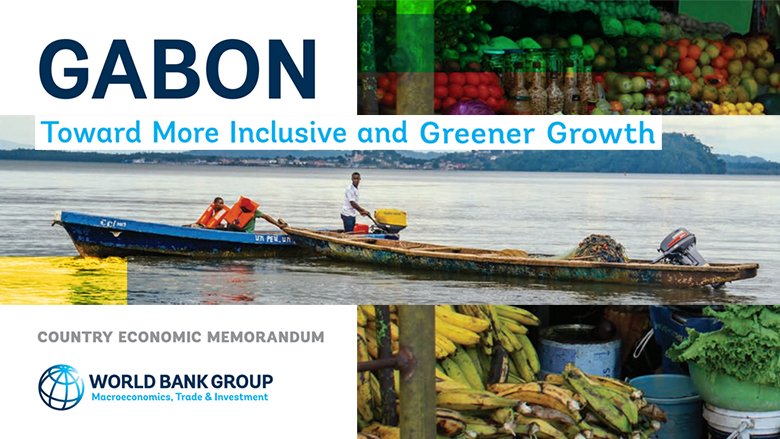In recent years, Gabon has positioned itself as a climate champion, undertaking a series of actions toward a green economy – with a strategy centered on agriculture, mining, sustainable fishery and timber resources, clean energy, and ecotourism. Its commitment to protecting forests and reducing greenhouse gas emissions is bearing fruit, as Gabon is the first country in Africa to receive a payment from the UN-hosted Central African Forest Initiative (CAFI). The country can continue to embrace a green economic transformation to reduce growth volatility and over-reliance on natural resources, unlocking opportunities for diversification, job creation, and stronger economic resilience.
Yet, despite its abundant natural wealth, growth has been slow to reduce poverty. Gabon is an upper-middle income economy, but real GDP per capita was 20% lower in 2020 than in 1990 and a third of its citizens live below the $5.50/day poverty line. Although Gabon’s economic base has expanded to wood, mining and services industries, lack of economic diversification remains a challenge. Gabon is one of the most highly commodity-dependent economies in the world, with oil, manganese and other extractives accounting for 98% of merchandise exports in 2021. As a result, the country’s growth, exports, and finances are still highly vulnerable to volatile global commodity prices.
The reliance on oil has hampered development of other economic sectors. The public sector employs over 50% of the formal labor force, while private sector growth, trade, and investments are constrained by difficulties in access to finance, an inadequately trained workforce, bureaucratic inefficiencies, burdensome regulations, high tariffs, and an inadequate infrastructure. According to a World Bank survey carried out for the report, 24% of traders stated that they were subject to discretionary fees at checkpoints along trade corridors in the country, revealing widespread practices of petty harassment and its adverse effects on local and regional trade. Furthermore, on the journey between the Cameroonian border and Libreville, a truck can be expected to be stopped up to 44 times, causing a delay of more than 15 hours and exacerbating transportation costs. The total cost is estimated at around 14% of the final consumer price of foodstuffs, increasing the cost of living and impacting vulnerable and middle-class households.
Inadequacies in human capital also hinder Gabonese growth. The social protection system has been steadily evolving over the last 15 years, yet non-contributory social assistance for the poor remains underfinanced, fragmented, and poorly targeted. In addition, one out of three young Gabonese is unemployed, while two thirds of job vacancies go unfilled. The promotion of technical and professional education and training as well as reforms to better align the education system to employment opportunities could contribute to reducing the imbalances between opportunities and aspirations.
A stronger structural transformation of the economy is crucial for Gabon to attain a better model for green growth and job creation. It can be achieved by: reinforcing labor supply through better skills and training; building a more efficient social protection system to support the most vulnerable; and creating economic opportunities in a more conducive environment for investment and trade, allowing the country to benefit from the opportunities offered by regional and global value chains. In this context, the green economy presents a unique opportunity for Gabon to achieve faster, more inclusive, and sustainable growth. To succeed in diversifying and greening its exports basket, Gabon could leverage its natural capital and invest in sectors such as agriculture, fishing, digital services, ecotourism, and forestry.
Recommendations
Key recommendations aimed at helping Gabon achieve accelerated, sustainable, and inclusive growth include:
- Matching aspirations with opportunities by improving schoolchildren’s proficiency in science, technology, engineering, and mathematics; providing targeted programs and financial support for vulnerable youth to pursue secondary and high-level education; further adapting the educational system to labor market needs and promoting technical and vocational training at early stages; and establishing an integrated well-targeted and well-funded social safety nets program to better support vulnerable groups.
- Building a more favorable business environment by reforming investment legislation and rationalizing investment incentives, including those applicable in special economic zones; increasing access to finance for small and medium enterprises (SMEs); reinforcing the competition regulatory framework; adopting a legal framework to promote digital development and support the information and technology sector; and creating incentives to promote research and development on environmentally sustainable practices in different industries.
- Greening and diversifying trade and production by strengthening Gabon’s trade policy formulation and implementation capacity; harnessing the opportunities created by the African Continental Free Trade Area (AfCFTA) to increase access to regional trade chains; investing in logistics and trade infrastructure; revising the tariff structure of CEMAC (Economic and Monetary Community of Central Africa); streamlining and digitalizing procedures to facilitate cross-border trade; improving forestry legislation; growing and/or reviving the country’s agricultural, fishery, and manufacturing production and exports, as well as exports of services centered on ecotourism, environmental services, and digital services.

